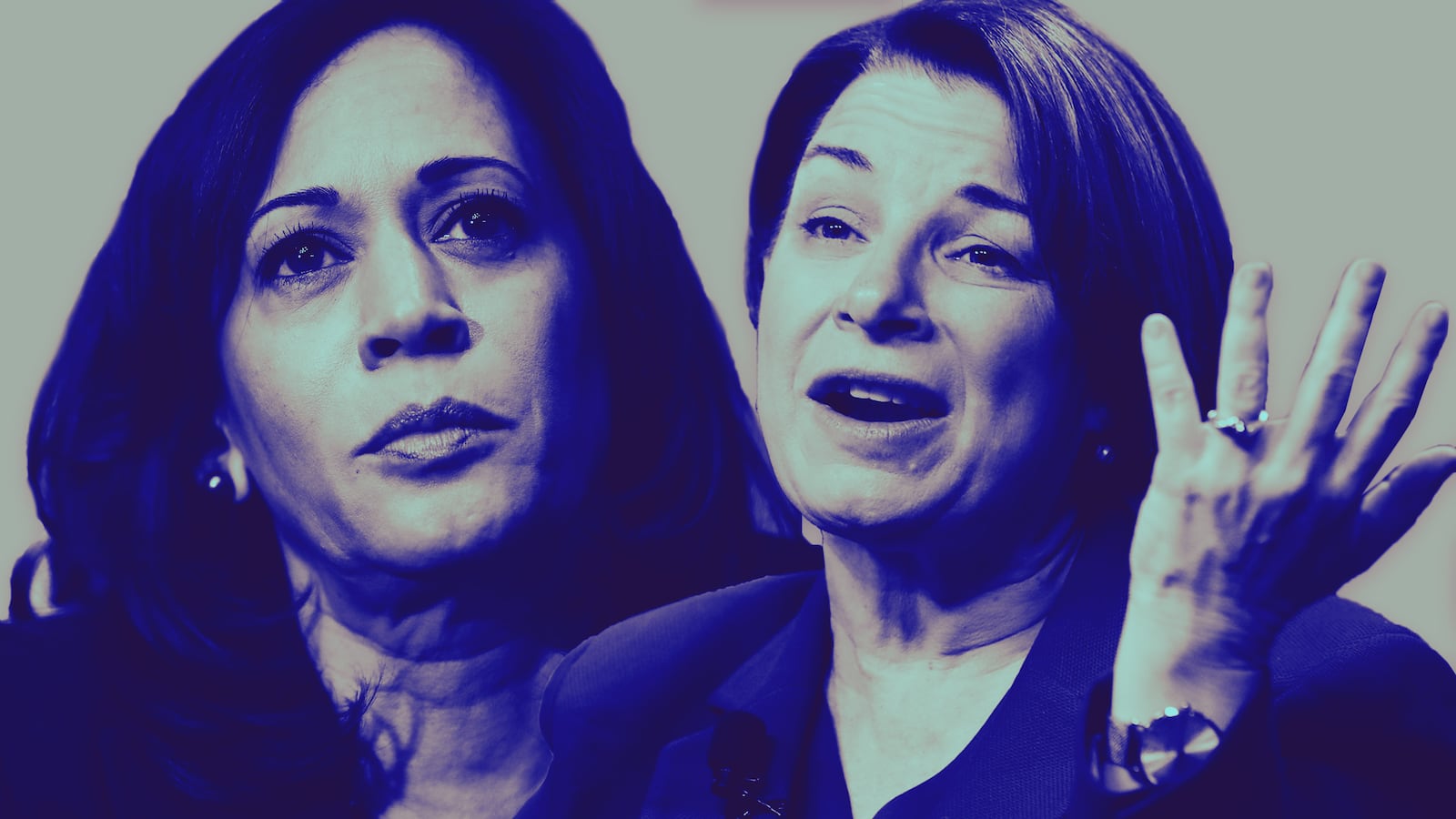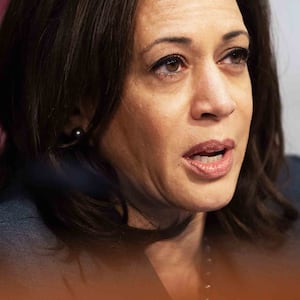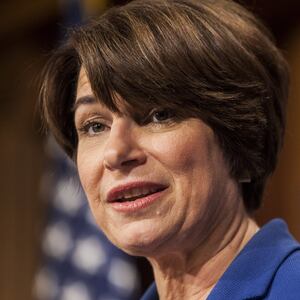Is having been a prosecutor a deal-breaker for running for president as a Democrat?
In recent weeks, progressive criticism has mounted against Sen. Kamala Harris, former attorney general of California, and Sen. Amy Klobuchar, former county attorney of Hennepin County, Minnesota. Each has been accused of taking a “tough on crime” approach during their tenures that contributed to mass incarceration (disproportionately of people of color) and slowed criminal justice reform.
Yet Harris and Klobuchar were hardly outliers. They were part of a system shot through with structural inequity, and are now being taken to task for not reforming that system aggressively enough.
On racial disparities alone, the statistics are sobering. Across the country, prosecutors are 95 percent white and police officers are 88 percent white; black men comprise 6 percent of the U.S. population but 35 percent of the prison population. Since over 95 percent of state criminal convictions are the result of plea bargains, those disparities are largely the result of decisions made by state and local prosecutors. Black men are 65 percent more likely to be affected by mandatory minimum sentences. And in one recent statistical analysis, two researchers found an “unexplained” 9 percent disparity in sentencing between black and white defendants who committed the same criminal acts, even after correcting for all other relevant characteristics.
Moreover, there are structural incentives in the election process that tilt toward strict enforcement; hardly any prosecutors are elected on the basis of being soft on crime. (The most notable exception is District Attorney Larry Krasner in Philadelphia.) The United States is the only country in the world that elects its prosecutors, and voters are voting for a law enforcement officer. According to one recent study, a prosecutor facing a contested election is 25 percent more likely to take a case to trial, rather than seek a plea bargain. Even when candidates refrain from hyperbole, the electoral “tough on crime” mantra emphasizes “wins,” even if the “wins” lead to over-punishment or injustice.
That was exactly Harris’s message in 2010: that she had raised conviction rates to their highest level in 15 years. Indeed, even as Harris is now being criticized for being too tough on crime, at the time she was criticized for inflating her conviction rates by accepting bad plea deals.
The question, then, is whether Harris and Klobuchar were worse than average, about average, or better than average but not better enough for some progressives.
While the data is complex and susceptible to multiple interpretations, the third answer appears to be correct.
Klobuchar first. From 1997 to 2007, she “put drug offenders behind bars more frequently and for longer stretches, sharply increased the prosecution of repeat offenders, and launched campaigns against graffiti and vandalism,” as The Daily Beast’s Sam Brodey reported. Further, she “doubled the rate at which drug dealers were sent to prison, and successfully prosecuted nine times as many ‘career offenders’ as her predecessor did the year before.”
Crime rates decreased, and Klobuchar prosecuted high-profile cases against Minnesota Twins star Kirby Puckett and Judge Roland Amundson. She drew praise from conservatives and liberals alike. There’s no evidence that Klobuchar’s office treated people of color disproportionately bad; based on national trends, her record was actually better than average.
The criticisms against Klobuchar are that she didn’t address racial disparities in prosecution, didn’t lead on criminal justice reform, and swelled prison populations with her “tough on crime” approach–in particular supporting, and then implementing, a law that made drunk driving a felony.
In other words, she was a typical state prosecutor.
Now, with the benefit of hindsight, Klobuchar has jumped on the criminal justice reform bandwagon, acknowledging the systemic racism in the criminal justice system, cosponsoring a federal bill providing lesser penalties for low-level drug offenses, and so on.
You could say this conversion is opportunistic. Or you could say that Klobuchar came around on criminal justice reform around the same time most other people did. She is being faulted today for not having been in the progressive vanguard 15 years ago.
That, of course, is enough for some progressives to “cancel” her in today’s culture of purity tests and Democratic auto-cannibalism. But if that is the test, it’s hard to think of a single prosecutor in 1990s-2000s America who could run for president as a Democrat.
Harris is similar but, unlike Klobuchar, has set the bar higher. She dubs herself a “progressive prosecutor,” an alliterative oxymoron reminiscent of George W. Bush’s “compassionate conservative.” The reality is more mixed, with Harris frequently triangulating among various political and ideological interests.
On the progressive side, Harris has supported bail reform, implemented training for cops to correct for implicit bias, and started programs that replace jail for first-time nonviolent offenders with vocational training. As a New York Times profile observed, she told people as far back as 1990 that she was becoming a prosecutor to reform the system from within.
University of San Francisco Law Professor Lara Bazelon complained recently that when it came to criminal justice reforms, Harris had “opposed them or stayed silent,” though the actual reforms in question (abolishing the death penalty, supporting body cameras for police) remain contentious even among Democrats. Bazelon also cited one instance where Harris’s office knew about a rogue police lab technician but did not alert defense lawyers. But whether such notifications, known as Brady disclosures (after Brady v. Maryland, the case which announced the obligation), are required in particular cases is contested all the time. Once again, it’s hard to imagine a single prosecutor’s office that hasn’t been cited for failing to disclose.
Bazelon also faulted Harris for upholding the “technicality” of the law in cases involving possibly wrongful convictions. Yet arguably, from a justice perspective, an all-powerful prosecutor choosing to disregard legal procedure would be far worse.
Perhaps Harris’s most notably conservative decision was to oppose a full investigation of the Orange County District Attorney’s office regarding its secret informant program. That program–involving informants placed in jails to instigate confessions from other inmates–was so egregious that a judge recused the entire DA’s office from a case after it was found that the office essentially lied about the program’s existence. Harris initially declined to investigate, saying there was no direct evidence that the DA actively participated in the program, then promised to investigate but never released a report.
Still, overall, whether out of principle or politics, Harris has a record that is better than average for prosecutors, but not on the leading left edge. This has been enough to raise serious opposition on the progressive side of the Democratic Party.
Of course, having a record of being “tough on crime” might help a Democratic candidate in a general election, particularly squaring off against Donald Trump, who has revived the old slogan of “law and order” as a campaign issue while flagrantly trampling on the rule of law in his own personal, political, and rhetorical conduct. A tough prosecutor with liberal credentials but a record of non-ideological advocacy could be a worthy opponent to this particular president.
But in the primary, it’s quite possible that no former prosecutor is liberal enough to win the nomination. They were, after all, part of a broken system, even if relatively few people realized it at the time. Now they may pay the price.








